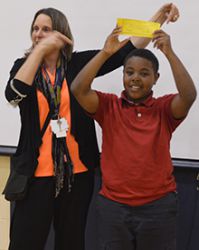Quinn Hodgman knows he has a “spark.”
“It’s what’s special about you, what makes others not you,” said the Coit Creative Arts Academy fourth-grader, while painting a wooden birdhouse during the district’s after-school LOOP program. Quinn learned about his spark at LOOP, where site coordinator Kimberly VandenBerg helps students develop a sense of purpose and connect it with future opportunities.
| Re-imagining Yourself Imagine U aims to help students develop skills in the following areas:
|
Quinn said he has a range of interests, and that he knows he’ll accomplish his goals.
“They help you figure out what you want to be when you grow up,” he said about VandenBerg and other instructors. “LOOP helps you get a head start and I like that about it.”
VandenBerg is constantly making connections between activities and careers, college and community. She also weaves in reflection time to talk about emotions, another component of helping students along the path to achievement.
That strategy is intentional. Last year VandenBerg completed training through Imagine U, an initiative to give providers of extended learning programs tools to help children succeed.
Imagine U was designed by several entities: the Expanded Learning Opportunities Network, which is facilitated by Our Community’s Children, a partnership of the city, the school district and the community.
It is funded through Believe 2 Become, an initiative of the Doug and Maria DeVos Foundation, which helps ELO providers. The ELO Network has 60 partner organizations serving students from multiple area school districts.
“Ultimately, we are wanting to ensure that young people see themselves in the future, actively defining their goals and working to overcome the challenges that get in the way,” said Lynn Heemstra, executive director of Our Community’s Children.

Tools to Empower
Imagine U helps ELOs like LOOP develop programs that provide a safe place for students to make mistakes, learn from them, realize their dreams and develop a sense of self. Instructors are encouraged to get to know the assets of each child.
“It’s about, ‘I’m going to get to know you, what you bring here, and help you discover the kinds of opportunities there are to realize your potential,’ ” Heemstra said, noting that knowing a child’s strengths, likes and dislikes will help engage them.
“We know we have to focus on the whole child, so we have to pay attention to what their experiences are and what their culture is.”
Imagine U zeroes in on helping students develop mental skill sets, as outlined in a recently launched digital toolkit. They include future orientation, success mindsets, and social and emotional learning.

“When students are armed with these capacities, tools and assets, they are ready to be self-directed, self-motivated, self-driven agents of their own successful futures,” said Chana Edmond-Verley, senior program officer of Believe 2 Become, during a webinar about the program.
Imagine U’s activities use the work of Ron Ferguson, director of the Achievement Gap Initiative at Harvard University. The program also emphasizes teaching children to learn to believe in themselves and realize they have great potential.
“There are many students who think ‘Everybody is better than me. There’s no place for me in the world,’ Ferguson said in the webinar. Imagine U is about helping them realize “there is a destination in the world that is theirs,” and they can “achieve their own personal life story.”
All young people have the desire to succeed, he said, even if they aren’t yet willing to admit it. Schools, workplaces, homes, neighborhoods and churches can all be part of the equation in holding students to high expectations and creating opportunities for success.

Looping Back to LOOP
Grand Rapids is becoming a community filled with administrators, educators and community members who are tapping into the potential of students.
LOOP includes 30 program sites managed by Camp Fire USA, United Methodist Community House and the YMCA of Greater Grand Rapids, in partnership with GRPS. It focuses five days a week on helping children make big connections. Field trips benefit the community, like bagging lunches at Kids’ Food Basket, where students learn about how the bags many of them bring home get packed, and where they talk about careers in service fields.
Lessons tied to the environment involve art and science. VandenBerg talks a lot about science, technology, engineering, art and math, or STEAM. She also emphasizes communication, teaching students about making good eye contact.

Coit fourth-grader Rashawn Rogers said LOOP has helped him learn about careers he can pursue in athletics, like coaching. “They give you a whole bunch of topics about what you want to do,” he said. “LOOP has answered for me how to experience the life you want so you can do what you want to do when you get older.”
Fifth-grader Aumbria Earvin said she realized her passion is art, and she hopes to someday be a traveling artist. How can she make that happen? “By trying hard enough, making mistakes and practicing.”









